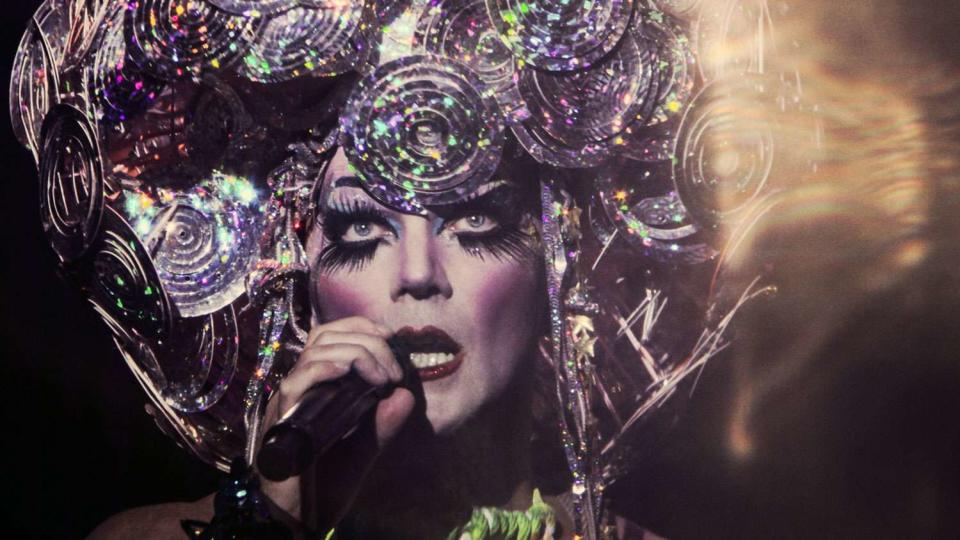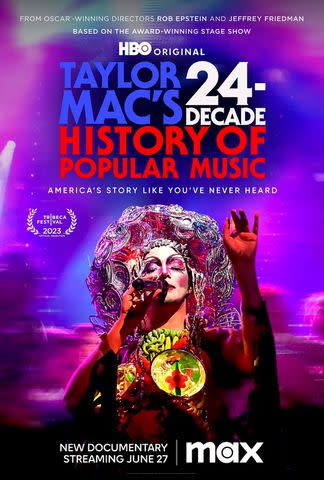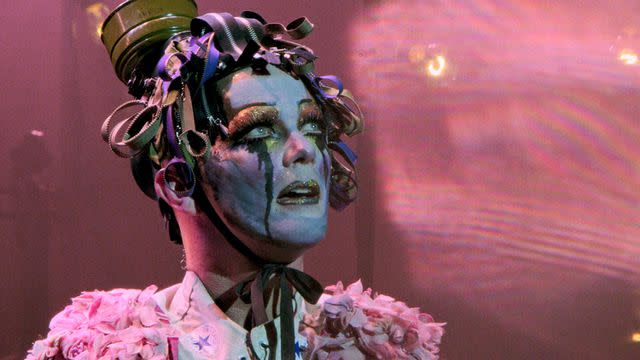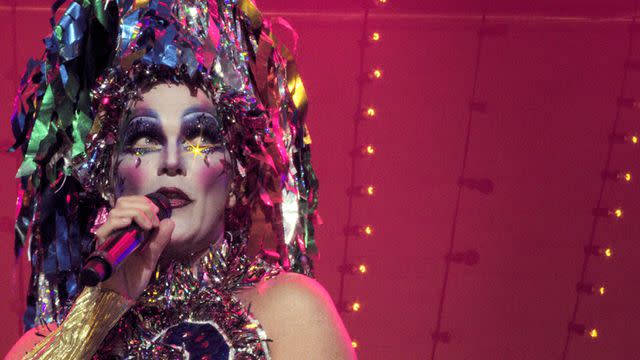Queer Performance Artist Taylor Mac Performed All of American History in 24 Hours: Here's How (Exclusive)
“I'm not trying to make something that the mainstream is comfortable with,” says the playwright of documentary ‘Taylor Mac's 24-Decade History of Popular Music’

HBO
Taylor Mac's 24-Decade History of Popular MusicDrag performance artist, thespian and MacArthur Genius Taylor Mac did the unthinkable in 2016: for a full 24 hours onstage, Mac sang and improvised though decades of U.S. history in front of a live audience.
As revealed in the new HBO documentary Taylor Mac's 24-Decade History of Popular Music, Mac, now 49, designed the immersive show as a one-time-only theatrical experience.
“It’s authentically itself,” the Tony-nominated playwright tells PEOPLE of the stage show. “And I think it's unlike anything most people will have seen in their life. It's unlike anything I've seen in my life, you know? And I made it!”
How to complete such a performance marathon? Electrolyte-infused water, green tea extract and several B-vitamin shots, as Mac explained to The New York Times at the time.
Of concluding the show (which ran from noon October 8, 2016 to the following noon at St. Ann’s Warehouse in Brooklyn, New York), Mac told NPR, "It felt a little bit like a ritual sacrifice… I came home and I fell asleep at the dinner table."
The effort did not go unnoticed; in 2017, A 24-Decade History of Popular Music became a finalist for the Pulitzer Prize for Drama.
Directed by Academy Award winners Rob Epstein and Jeffrey Friedman (the filmmakers behind The Celluloid Closet and Linda Ronstadt: The Sound of My Voice), the new concert documentary includes footage from the 24-hour show, where Mac and an eclectic group of 24 musicians performed 246 popular songs from each decade of American history — from “Yankee Doodle” to The Rolling Stones’ “Gimme Shelter” and Bruce Springsteen’s “Born to Run.”
“It's queer, but done with popular songs,” judy explains. (Since becoming a performance artist in off-off-Broadway theaters and underground clubs across New York City, Mac has claimed the gender pronoun “judy.”)
The film also features snippets of interviews with Mac, judy’s colorful costume designer Machine Dazzle and the show’s music director Matt Ray and co-director Niegel Smith. As Mac says in one such interview segment, filtering each era’s hits through a radically queer lens exposes how ephemeral and subjective history is.
The work, ultimately, is about “bringing people together and having them do odd things like throw ping pong balls at each other,” Mac tells PEOPLE with characteristic cheekiness.
Related: Tony Awards 2023: See the Complete List of Winners
When asked what our current decade of pop music might look like, Mac reiterates what judy said during the years-long preparation for the 2016 show: no, there will be no revisiting this outrageous theatrical feat.
“I have not thought about adding an addendum because it just feels all so present,” Mac says. “But every hour of the show [was] about a different community building itself as a result of being torn apart. So I think [this decade] probably would have to focus on Black Lives Matter or the trans community. Right now that's what's happening in the U.S., those are the communities that are being torn apart the most, but that are building themselves as a result.
“There's so many things that we could do a whole other decade on, and that's the great tragedy,” Mac adds. “But it's also quite moving to see everybody find their foundation as a result.”
Read on for more from PEOPLE’s exclusive conversation with Mac. Taylor Mac's 24-Decade History of Popular Music premieres on HBO and will be available to stream on Max June 27.

HBO
Taylor Mac's 24-Decade History of Popular MusicPEOPLE: How do you approach squaring your highly unconventional work against the proverbial mainstream?
TM: I don't wanna say I'm an anti-capitalist — I lean towards anti-capitalism more than I do other forms of commerce. But yeah, I don't think my art is ever trying to win capitalism. And that's what I love about this film so much. It's very rare to see queer work given such a mega platform like HBO and have it not have it not squash the work and be presented as, oh look, these artists are trying to win at capitalism and have they succeeded? And if they've succeeded, that means it's good. And if they don't, that means it's suspect.
That's not actually happening here in some way. HBO has done this beautiful thing and by supporting Rob and Jeff to do what they wanna do, they've kept our aesthetic. They've kept the feel, they've kept the real queerness of it, and they've just elevated that for people to experience. So it's really moving to me because I don't think I've ever seen something from our world get this much of a platform and have it not flatten it, if that makes sense.
For me, it's just an invitation. Like, I'm not trying to make something that the mainstream is comfortable with. But I do wanna invite them into the discomfort or the curiosity of what we're doing. And so I'm never trying to bash them over the head, and I'm never trying to exclude them and pretend like we're cooler than they are, which we're not. I'm just trying to invite them into this different experience. And so it's all about invitation, invitation, invitation. That's what I hope the film will continue to do.

HBO
Taylor MacIn the film, you say that in performance art, there is no failure. How consciously are you trying to lead audiences away from general assessments of good and bad?
TM: Yeah, it's about perpetual consideration. You're just trying to wonder about something for your life. That's really what the offering is. It's not so much about, this is good art, this is bad art, this is this, I agree with this opinion, I disagree with this. It's not really about that. It's about, let's wonder about this together.
That's why I say “invitation.” Do you wanna come wonder with me for a while? And maybe you don't want to now, but maybe in 10 years you will. Or maybe tomorrow you will.
Talk about the difference between this piece in theater form versus film. Did you ever feel that filming this show made it less ephemeral, more set in stone?
TM: There was a little bit of that. But what you learn when going through history is that nothing is set in stone. [Laughs] History is a breathing thing, and our interpretation of this film will change in time. And again, it's not about whether or not it works or it doesn't work.
[The show is] about considering. And so there is no such thing as something that is not ephemeral in terms of our consideration. Consideration is ephemeral. And so I think it still holds its beautiful little integrity and it's not pretending to be anything it isn't. I just am in love with it, so that's great.
Were there things, looking back on the 24-hour show, that you wish you'd done differently?
TM: Oh, yeah. I mean, almost every moment. [Laughs] That was the great thing about performing on stage, and the way that I perform is that I could change it every single night. I heard Brian Dennehy one time say, “If you had eight shows a week, one of them's gonna be your best. One of them's gonna be your worst.” You know? And so moving forward with that idea, you think, if it's bad tonight, tomorrow night it could be better. It could be worse.
But I could always change things. And a good 20 to 30 percent of the show was improv every night. And so it allowed me to grow and move and adjust with the times and with the people that were in the room on that night.
And so that shifts with a film. But in some ways, it doesn’t! I just watched Carnal Knowledge again for the first time in 25 years. And my whole take on the movie was different from, what, 25 years ago. So you're still moving and shifting.
It's when we decide and then we base our activism off of a trauma response, I think that's [bad]. That's when we get into trouble. [Laughs] ’Cause we're not so clear-headed. Like saying that Hillary Clinton was molesting children in the basement of a Pizza Hut — that's not clear thinking. That's an opinion based on the trauma response of something. I don't know what the trauma is. But it's not clear thinking. It's an agenda based on a panic. So I think it's better to just, like, wonder about the world.

HBO
Taylor MacIn general with your artistic mission, how much are you looking at your personal upbringing or background as material?
TM: I can't make anything up, you know? [Laughs] I just cut and paste from life, as a playwright and as a performance artist, and as an actor, and as a singer, as a songwriter, all of those things. I'm always just cutting and pasting from life. It's sometimes useful to lead with your curiosity about other people. And it's sometimes useful to brave, use your own personal vulnerability.
Definitely one of the tricks up the sleeve, if you will, one of the ways that performing artists open their hearts up to a large group of people is to share — and some might say overshare. [Laughs]
What is your home life like, your stasis? During the pandemic, fans watched you play banjo in the woods.
TM: I'm still trying to learn that banjo! [Laughs] Yeah, my personal life is great. I got a sweet man that I've been with, well, since 1997. So 26 years now. And I've got nothing to complain about, you know? ’Cause I make my art, try not to make too much money, but try to make enough so I can be comfortable. Not too much! You know, the people who made too much are miserable, I have noticed.
And yeah, I just try to prioritize verbs more than nouns, more than possessions. That's what I try to do. Try to do more, you know — go on a walk. Don't ask for a noun for Christmas, ask for a stroll or something like that.
What does self-care look like for you?
TM: I'm doing Alexander classes again for the first time. And that is the thing about having a little extra money in life, you can do a little bit more self-care, which is really nice. I'm in therapy, I'm taking Alexander classes, trying to eat better. I'm all for everyone having a set income, or [making] therapy free… So everyone can be in therapy and everyone can afford cream for your face. [Laughs] Government sponsored cream for your face, yes, please.
For more People news, make sure to sign up for our newsletter!
Read the original article on People.

 Yahoo News
Yahoo News 
